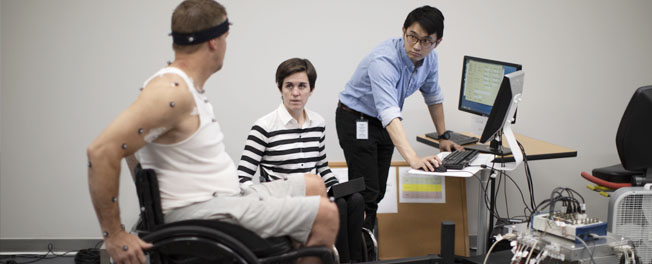
Enabling Mobility in the Community Laboratory
General Laboratory Description
Dr. Morgan directs the Enabling Mobility in the Community Laboratory, which conducts community-based research to bridge the gap between services offered to persons with a disability through rehabilitation and in the community. Strong methodological approaches are implemented to examine community-based interventions promoting health, decreasing secondary conditions, enhancing mobility, and improving physical fitness for persons with a disability that can be offered post-rehabilitation to enhance their participation in meaningful life activities. The lab’s primary study population is adults with mobility disabilities including spinal cord injury, multiple sclerosis, and stroke. Additionally, Dr. Morgan also oversees the GoBabyGo program for children ages 18 months to 5 years old with mobility disabilities. The goal of this program is to provide modified ride-on cars to support young children with mobility disabilities as they develop skills that will prepare them for future independent use of mobility devices and to increase social participation using age-appropriate play.
General Description of Student Activities
Students may have the opportunity to participate in lab activities such as:
- Observe, interact, and collect data with gym members attending the Orthwein Center accessible gym
- Assemble and modify ride-on cars for children with mobility disabilities
- Work with participants and their families during their appointments
- Work with other members of the research lab
- Work with outside organizations such as Paraquad, a disability organization, and NuMotion, a medical equipment provider
- Literature reviews, data entry and analysis, and writing journal articles
Time requirements are in line with the Program in Occupational Therapy expectations. The laboratory activities are conducted at the Stephen A. Orthwein Center at Paraquad at 5200 Berthold Ave.; therefore, the ability to transition between 4444 Forest Park Ave. and the Orthwein Center is necessary.
Examples of Projects
- Assessing the effectiveness of a community-based exercise program for persons with a disability
- Examining the duration and intensity of exercise programs to change the overall physical fitness of persons with a disability
- Implementing interventions to train manual wheelchair users in wheelchair propulsion biomechanics using motor learning principles
- Further developing a mobile health text-based fatigue self-management program for persons with a disability
- Exploring participation limitations as persons with a long-term disability age
- Working with pediatric clients by developing protocols and furthering programming for the GoBabyGo program
PhD Mentor Information
The focus of Dr. Morgan’s research is to generate empirical knowledge helpful for guiding community based and person-based interventions that improve the participation of people with mobility disabilities. Her work ranges from community-based participation studies to basic mechanistic studies of biomechanics of the upper extremity for manual wheelchair users during propulsion. Earlier in her career, Dr. Morgan assisted with the development and testing of standardized measures that assess the quality of participation in major life activities and the environmental facilitators and barriers impacting participation for people with disabilities. In addition, she created a community-based program housed in a local independent living center that provides services for people with disabilities (such as health and wellness programs and assistive technology assessments and training). Dr. Morgan also developed a device (an instrumented wheelchair roller system) to provide health-care professionals evidence-based options for providing wheelchair training and exercise programs.
Research Foci
- Improving the implementation of community-based programs to increase the participation and health of people with mobility disabilities
- Determining the best methods of community intervention and education to improve participation in physical activity for persons with a mobility disability
- Identifying the physical activity needs of persons with a spinal cord injury as they transition out of rehabilitation and into the community and how best to meet those needs
- Determining the duration and intensity of exercise necessary to impact long-term health outcomes in people with mobility disabilities
- Developing tools to test physical exertion and physical fitness in people with mobility disabilities
Current PhD Student
Rachel Heeb, OTD

